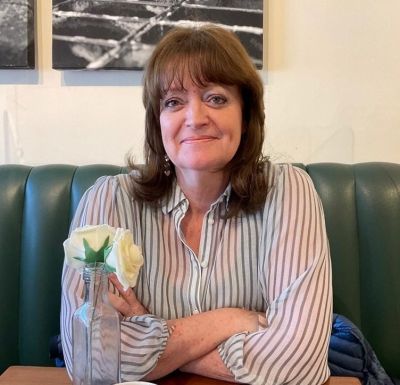
Morgan Lee-Stephens
Wednesday 1st June 2022
In January this year, while at an appointment with her GP, 63-year-old Morgan, mentioned she had started becoming breathless and had a sharp pain in her chest while walking up an incline. Recognising these were symptoms of a potential heart condition, her GP listened to her heart and heard a murmur. Just weeks later, Morgan was diagnosed with severe aortic stenosis, requiring an urgent, lifesaving intervention.
This is her heart valve disease story:
“My story started in January this year when I went to the GP for an unrelated health issue. At the end of the appointment, she asked if I had any other issues, and I said yes. I had noticed that I was getting out of breath and would get a sharp pain in my chest when I was walking up a slight incline on the way to pick up my grandchildren from school. At the time, I thought I was unfit and just getting older, but she listened to my heart and said I had a strong murmur and needed an echo.
At that time, I was planning the holiday of a lifetime with my partner, and it was a big trip that was costing a lot of money. Unfortunately, the travel insurance wouldn't cover me without a diagnosis, so I needed to find out what was going on. On February 9th, I had my echo, and the Cardiologist told me I had severe aortic stenosis and I wouldn’t be going anywhere. I could not believe it!
The Cardiologist referred me to a Surgeon, who called me a few weeks later and said that due to the backlog caused by the pandemic, I was looking at 3-6 months until surgery despite it being severe. I immediately thought, am I just going to drop dead? I was terrified. I also had an active job that I could no longer do while I waited for surgery, so everything just stopped.
With my whole life on hold, I either waited under the NHS timeframe or used my life savings and paid for it privately. While I was happy to be seen under the NHS, the diagnosis was both mentally and physically draining. Knowing I needed the operation urgently, I felt there was no alternative and went private. After the operation, my surgeon explained that my aortic valve was classed as pseudobicuspid (having three cusps, two of which were fused together) with the opening only the size of a pinhole, so for me, it was the right decision.
Severe aortic stenosis is a serious, life-threatening condition. I used my life savings to save my life. While it is not the fault of the NHS, sadly patients are dying while waiting for this vital surgery which is heartbreaking!
Before this diagnosis, I knew very little about heart disease and certainly nothing about heart valves. I’d never even been in a hospital except when giving birth. So, I started to research the different types of valves. Knowing a mechanical valve would require a lifetime of living on warfarin, it wasn’t for me, so in consultation with my Surgeon, I opted for a tissue valve instead.
My heart surgery took place on April 1st, and, now, nine weeks after surgery, I feel brilliant. Everything is going well. I’m getting my stamina back and even starting a new job. While I have had some issues with getting cardiac rehab class, I’ve been following an excellent programme through the British Heart Foundation every day on YouTube.
While going in for such a major operation is truly terrifying, trusting in your Surgeon is paramount.
Amazingly the time in hospital after surgery can be only 7 days, so as long as you just take one day at a time and accept that you must gradually allow your body to heal, then before you know it, life will start to return to normal and you once again can do all the things that are dear to your heart. For me, that is being able to run around with my grandchildren, go dancing with my partner, and start a new chapter of my life."
Heart Valve Voice Executive Director, Wil Woan, said: "Thank you, Morgan, for sharing your incredible story. It is a sad fact that many patients are facing delays in their lifesaving treatment due to the backlog caused by the pandemic. Severe aortic stenosis is a serious, life-threatening condition, and patients, clinicians and policymakers will want to work together to find a way to protect the pathway for patients like Morgan so that in the future all patients get their treatment in the right timeframe without feeling they have to pay for it."


